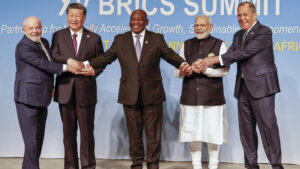
The National Interest Foundation Newsletter
Issue 204, September 1, 2023
Welcome to our NIF Newsletter. In this week’s headlines: we analyze BRICS recent expansion and future plans, look into the recent diplomatic debacle between Libya and Israel, examine Sudan’s proposed peace deal and why it failed, and explore the recent trip by U.S. Congress members to Syria.
BRICS Expands

A recent BRICS conference ended with the largest expansion in the history of the group. (Photo from AFP)
The Future of BRICS and US World Influence
By Jacob Van Veldhuizen
The economic grouping BRICS has announced they have invited 6 more countries to join the organization. 4 of these countries are from the Middle East; Iran, Saudi Arabia, the United Arab Emirates, and Egypt. The others are Argentina and Ethiopia. These countries were chosen strategically. They are all relatively large emerging economies and cover a wide range of areas. The main surprise in this group is Iran. Some of the countries in BRICS, mainly India and Brazil, do not want the organization to become anti-western. They still have valuable relationships with the U.S. that they do not want to jeopardize. Allowing Iran in certainly does not help dissuade Washington that BRICS is simply a non-threatening alternative to the current system. The United Arab Emirates, Saudi Arabia, and Egypt are all in similar positions. They all have military alliances with the United States. This creates somewhat of a conflict of interest, and Saudi Arabia has still yet to join at the time I am writing this paper. Adding them to BRICS, makes the United States look weak and calls into question its role as the leading power in the world. It also creates a perceived threat to the sale of oil to the United States. Saudi Arabia in particular has much to consider. The alliances between the U.S. and Saudi Arabia have been strained as of late, and joining BRICS would only worsen the state of the relationship between the two countries. Argentina and Ethiopia round out the group of potential newcomers. Argentina was added at least partially at the behest of Brazil to boast South America’s impact in the group. Ethiopia, despite being rife with conflict, is still one of the largest economies in Africa and will help bolster the continent’s standings in the group.
Though adding new members increases the clout and GDP of BRICS, it may actually decrease the likelihood of it achieving its goal of creating a new economic system. The biggest issue with BRICS is that though they are all emerging economies, their political interests and economic abilities rarely align. They also make all decisions by consensus, meaning all countries involved have to approve a decision. With this in mind, adding more countries with diverse political and economic goals could prevent BRICS from implementing its planned policies. There is also another issue that sprouts off of this. Many of the countries in the group also have different goals when it comes to BRICS. China, Russia, and Iran want to use BRICS as a way to challenge the current Western-led economic system. One of the ways they aim to do this is by replacing the U.S. dollar as the world’s reserve currency. This task is already difficult enough with a united front. If by some miracle BRICS was able to make a consensus, they would then also have to convince borrowers, lenders, and currency traders to actually use it. What should be of some concern to the United States is that many BRICS countries have used local currency in some of their trades.
Other countries, namely Egypt, Brazil, and Saudi Arabia all have issues with the current Western-led system but also have deep connections with the leader of that system, the United States. This further complicates any ambitions of China, Russia, and Iran to challenge the Western order. Brazil has explicitly stated that they do not want BRICS to become an “anti-western” organization. Saudia Arabia (at the time of writing this article) has still yet to accept the invitation. They are weighing their options. Many countries really seem to be joining BRICS to hedge their bets in case a dollar-related economic catastrophe was to happen. India, though not explicitly on board with the anti-western sentiment, has already agreed to purchase 1 million barrels of oil from the UAE for rupees. This is the first time an oil trade has been made without using the dollar.
Historically, it takes decades and extended, large-scale disruptions to the global economy to bring about a change in the world’s reserve currency. There is a recent historical precedent. This happened shortly after World War II and the switch from the British Pound to the American dollar. This was also at a time when the United States began to move into its position as a global military and economic power. China’s economy is growing very quickly but is showing signs of slowing. The economic harm caused by the COVID-19 pandemic was not just felt in the United States but across the world. Many economic experts are still convinced, however, that China will eventually surpass the U.S. in economic size. Predictions for when this will happen range anywhere from 2030 to 2050. Though these predictions are just that, they should be seen as a timeline for the United States and its allies to reorganize the global economy in a way that is agreeable to the majority of the world.
Considering all of this, the United States does not have to worry about losing its global economic hegemony, at least for now. The US dollar is still used in at least 90% of trades worldwide and even countries in BRICS continue to use the dollar in trade. What should be alarming to the United States is the number of traditional allies who are joining BRICS. There are also at least 40 other countries that are interested in membership. This should be a clear sign to the US that the current Western-led system is no longer viable as a long-term policy. If we wish to avoid a China-led world economy, the United States must work with its partners in both the Global North and South to find a system that is more equitable for all. If this is done, it will decrease the need among developing countries to seek out a new economic order. There is also the added geopolitical bonus of diminishing China’s ability to challenge the United States. Instead, the U.S. will retain its position as the global economic hegemony and its relationships with its allies will begin to move in a more positive direction.
Israeli-Libyan Meeting

Protests broke out in Libya because of the meeting between the foreign ministers from Libya and Israel. (Photo from AFP)
Israel Foreign Minister Discloses Secret Meeting with Libyan Foreign Minister
By Brenna Haggerty
Early this week, news broke that Najla al-Mangoush, Foreign Minister of Libya, had a secret meeting in Rome with her Israeli counterpart, Eli Cohen. Cohen publicly announced what should have been a clandestine meeting, boasting progress towards normalization. Libya denied these claims and asserted that the meeting was unplanned and informal. The backlash was immediate and Prime Minister Abdul Hamid al-Dbeibeh was quick to shift blame and suspend Mangoush, dismissing her only a day later on August 28, 2023. Historically, Libya has been a strong proponent of the Palestinian cause, and while Dbeibeh insists Libya will never recognize Israel, this meeting spurred great unrest in the country. Civilian demonstrations threaten to completely destabilize the already fragile UN-sanctioned government in Tripoli.
Originally, Dbeibeh claimed that he did not know about Mangoush’s meeting with Cohen. Now, sources reveal that Dbeibeh approved the meeting a month ago and was briefed directly after it took place. In January of this year, CIA Director Bill Burns visited Dbeibeh to discuss normalization with Israel. He was open to the idea but feared public outcry. Mangoush’s dismissal was likely a way to shift the blame and avoid some of the damage to Dbeibeh’s reputation. Unfortunately, Cohen’s public statement and its fallout have endangered Mangoush, so she has fled to Turkey for her safety.
The United States knew about the meeting and encouraged Libya to attend, expecting it to remain secret. The Biden administration has since expressed its disapproval of Cohen’s actions. On top of the recent settlement violence, this has put further strain on Israel’s relations with the Biden administration. The administration also voiced concern about the repercussions of this exposure. This will also destroy what little trust was had between the United States and Libyan leaders. This severely limits the Biden administration’s ability to be involved in the negotiations.
The largest consequence of this meeting is the political unrest it is causing in Libya. With recent fighting in Tripoli and no stable government since 2011, the country is already in a very precarious position. Introducing yet another destabilizing factor creates unnecessary tension. The unified government under Dbeibeh has lost what little credibility it had and is now incapable of bringing the two separate governments together. There was already doubt surrounding his abilities to do so, but now it is almost certain that he will resign or be removed from office. The United Nations recently stated that they were waiting for a unified government in Libya before holding national elections. The United Nations decided to switch tactics after it became clear that the elections had stalled. Neither party wants to give up the position of power they have had for years. So, the UN decided to wait for unity to ensure all Libyan people had a voice and the proper election legislation could be passed. That plan is no longer viable as the likelihood of state unification is low.
Thus far, the countries that have normalized with Israel have been ignoring public opinion to get close to Washington. These countries are miles away, and the United States shelled out billions of dollars to secure the agreements. Morocco is a prime example of how public opinion and human rights are pushed aside in favor of economic and security-based agreements; Libya was the next target of the Abraham Accords. The United States made a diplomatic error in pushing an unstable country toward normalization. However, the blame also lies with Cohen for revealing the meeting.
With limited information on the meeting itself, it is somewhat difficult to determine the motivations of each actor. There are, however, some theories circulating. The motivation for Israel to go public with the meeting appears to be an independent decision. It was likely an attempt by Cohen to gain diplomatic clout and boast a new accomplishment against the Palestinians. The result instead was a total loss of trust and respect on the global stage. Other countries will be cautious to trust Israel with similar meetings after Cohen’s use of poor judgment. Other agreements in the Abraham Accords took years of underground negotiations before going public. Broadcasting this meeting so soon may seriously hinder Israel’s progress by deterring other countries from diplomatic talks. Libya’s reputation was damaged as well. It appears Dbeibeh agreed to the meeting to gain U.S. support while he struggles to maintain power in Libya. With the United States advocating for him to the United Nations, he would have more security as Prime Minister.
The Israeli-Libyan meeting may have been grounded in both personal interest and strategy, but all parties lost in this scenario. The United States lost any trust it had with Libyan officials and Israel lost its credibility as a diplomatic nation. Libya lost the most from this incident. The people in Libya are suffering due to political instability, the work to unite Libya has been reset, and they, too, seem less credible in the aftermath. If Libya is to have a chance at political progress and fair elections, it needs a new prime minister who can unite the opposition and execute legislative processes.
Sudan Peace Deal Fails Again

The deal put forth by Hemedti is largely seen as disingenuous. (Photo from Reuters)
Sudan’s Proposed Peace Plan for ‘Lasting Peace’ Appears to be Dead on Arrival
By Colin Bailey
The “long-lasting” peace plan proposed by Mohamed Hamdan “Hemedti” Dagalo, leader of Rapid Support Forces (RSF) has already been denounced by military rival Abdel Fattah al-Burhan, as he travels internationally for the first time since fighting began. This comes days after United Nations under-secretary-general Martin Griffiths, warned that the humanitarian crisis in Sudan was reaching levels of “epic proportions,” as thousands of civilians are at risk of starvation and disease as food supplies continue to dwindle.
Fighting in Sudan was reignited back in April over a disagreement on the integration of troops into a single consolidated force that would have assisted in transitioning Sudan to democracy. The primary combatants in this conflict are rivals Abdel Fattah al-Burhan, lead general of the Sudanese army, and Mohamed Hamdan “Hemedti” Dagalo, head of the RSF. The two groups have had a long history of cooperation, having worked together in the 2019 coup that saw the overthrow of President Omar al-Bashir and the 2021 coup that forced civilian politicians out of the government. Relations fell apart in mid-April over which organization would control a unified force, neither side wanting to hand over control to the other.
The RSF’s proposed “Sudan Reborn” plan consists of ten key points highlighting a need for establishing a democratic government that would have equal representation for all ethnic groups and peoples of different cultural backgrounds. Additionally, the plan emphasizes that ‘long-lasting peace’ can only be attained if widespread structural violence is put to rest alongside the unification of all armed forces in the region. Beyond the demands, no timeline for how unification would unfold was outlined in the RSF’s plan. The plan also does not elaborate on who would have control over the military, which remains the central issue of the conflict.
While the plan mimics the international consensus for establishing a democratic government in Sudan, such calls for equality in these proposed policies run in stark contrast to the events currently unfolding, as reports of ethnic cleansing and systemic sexual violence by the RSF and allied militias in western Darfur continue to surface. The aforementioned proposals could also be an attempt to ‘show face’ and direct focus away from the atrocities currently unfolding in RAF-controlled territory and appear more negotiable in the eyes of foreign mediators like the United States, which has yet to officially back either party. Based on Hemedti’s past behavior, it is very unlikely that this peace proposal was genuine. The fact that it coincides with Burhan’s visit to Egypt indicates that it is an attempt to even the diplomatic playing field. Sudanese expert Kholood Khair, founding director of the Confluence Advisory think-tank, said Wednesday, “Nobody in their right minds thinks this peace proposal is genuine. It’s a political ploy. This is war by other means, and it is targeted towards mediation actors and efforts.”
In a statement Monday, al-Burhan rejected calls for a ceasefire, stating, “We do not make deals with traitors, we do not make deals with anyone who has betrayed the Sudanese people,” outside Flamingo Base in Port Sudan. Al-Burhan further claimed that the RSF “are completely exhausted – just a little effort, and they will be finished.” Since then, al-Burhan has flown to Egypt to meet with President Abdel Fattah al-Sisi, which has been al-Burhan’s first trip internationally since the onsite of the war. Al-Sisi has expressed public support for al-Burhan and the Sudanese Armed Forces (SAF). Al-Sisi has attempted to intervene in the conflict, proposing a cease-fire alongside neighboring African countries. Such efforts have failed to provide any level of peace, however.
Al-Burhan’s tour to Egypt and Saudi Arabia is believed to be the start of a shift in strategy to garner international support to aid the SAF over the RSF. Thus far, the fighting has largely been contained to the western Darfur region and the capital city of Khartoum. Neither party has made any significant gains, continuously trading control over neighbors in and around Khartoum. Still, as reports of ethnic cleansing continue to surface and 4.6 million migrants have fled the region, fears continue to worsen among experts that the fighting will soon spread to the entire country, which would put millions at risk. Unless something drastic happens within the coming weeks, the humanitarian crisis in Sudan will only continue to worsen as neither party is willing to cooperate with the other.
Congress Members Visit Syria

This trip was made to bring attention to the plight of the Syria people in rebel-held land. (Photo from AFP)
Why U.S. Congress Members Visit Rebel-Held Syria
By Loretta Wolchko
This week saw the first U.S. delegation visit to a war-torn Syria in six years. The last visit was led by Sen. John McCain in 2017 to meet with opposition fighters in support of increasing U.S. aid to the opposition. This most recent delegation included Republican Congressmen Ben Cline, Scott Fitzgerald, and French Hill. The Congressmen were welcomed by orphans who live at Wisdom House, a school for orphans started as part of the U.S.-backed Syrian Emergency Task Force which facilitated the delegation. Community members in Hill’s home state of Arkansas have been some of the leading donors to Wisdom House and the Wisdom House Project, based in Little Rock.
As Syria enters its twelfth year of civil war, having claimed over six hundred thousand lives and displaced millions thus far, the nation is no closer to resolution. The trip comes at a volatile time for the stability of Syria as the war continues with issues arising all over the country, under both the Syrian government and the opposition. Last week, protesters in the government-held regions of the country gathered in opposition to President Bashar Al-Assad’s regime and poor living conditions. The U.S. has received criticism for its inaction towards Assad in recent years. Congressman Hill in particular has been outwardly critical of the Biden administration and the lack of action being taken against Assad, his corruption, and crimes against his people. This recent visit was likely a calculated move to call more attention to the situation in Syria and call out Biden’s inaction. The Congressmen visited a zone in the northwestern part of the country which has been under the control of rebel forces. The arrival of the Congressmen comes less than two weeks following U.S.-imposed sanctions on three leaders of the Syrian National Army (SNA), formerly the Free Syrian Army, in northern Syria. The U.S. Department of Treasury imposed the sanctions due to reports of the commanders in question allegedly committing human rights violations against residents in the area. The use of sanctions against places the U.S. has determined to be state sponsors of terrorism is not a new phenomenon, but for the most part, has been an ineffective strategy.
The SNA is backed by Turkey. These sanctions were intended to serve as a message to Turkey to rethink its current strategy in how it governs the territory. Turkey has recently been turning away refugees looking to flee and deporting those who escaped the warzone that was once their home. It is unlikely that sanctions will persuade Turkey or any parties in Syria to alter their policies. There has been little change. The people of Syria are still subject to immense suffering and cruelty at the hands of its government. There are also certain groups in rebel-held areas that have allegedly violated international human rights law.
The reactions from the people of Syria to the U.S. visit were mixed. The orphans and teachers who greeted the Congressmen welcomed the group with flowers and hugs, saying it was an honor for the group to come visit. Not far from the country’s border with Turkey resides families who have been displaced by the recent earthquakes. Neither the families staying at the camps nor those volunteering their time to manage the camp were aware of the delegation until after they were gone. They did not seem to care much about the visit upon learning about it. The trip was not publicly announced due to safety concerns, but the indifference of those in the makeshift camps still shows the skepticism surrounding what change will come now that the U.S. has finally set foot in Syria once again. It seems that many of these communities have this same doubt.
The U.S. is constrained in how much action it can take in regard to the Assad regime as well as the maltreatment of those in the rebel-held territory. French Hill has actively voiced his thoughts on how imperative it is that the Biden administration and other nations continue humanitarian support for Syrians. A new law called the Assad Regime Anti-Normalization Act of 2023 aims to hold Assad and his allies accountable and deter normalization. This bill shows that Congress will continue to pressure Biden and future presidents to uphold the sanctions against the Assad regime. However, without the U.S. dismantling the Assad regime itself and assigning a provisional government, it is unclear just how far the U.S.’s efforts can go. It is the hope of many that this visit and the introduction of new bills targeting Assad will begin a domino effect dismantling the dictatorship, but this still remain unlikely.
